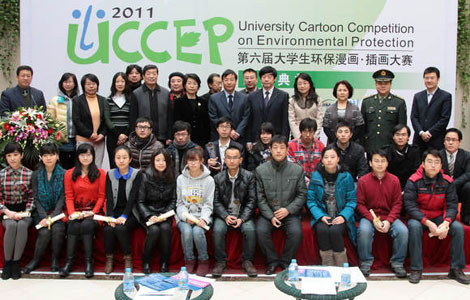Officials call for support of the cultural industry
Updated: 2012-01-04 07:50
By Huang Ying (China Daily)
|
|||||||||||
BEIJING - To compete with foreign rivals, Chinese cultural businesses should both become stronger and adapt to the international culture market, according to a senior cultural official.
From 2001 to 2010, the value of China's exports of cultural products increased 2.8 times and its exports of cultural services increased 8.7 times, according to the Ministry of Commerce.
"In general, there is still a long way to go for the strength of our cultural trade to grow, since it depends on the development of the domestic cultural industry," said Hou Xianghua, director of the Ministry of Culture's bureau of external cultural relations. "Among everything that should be improved, Chinese cultural enterprises should play a dominant role."
In September 2009, the State Council, China's cabinet, released a Blueprint for Reinvigorating the Culture Industry. In keeping with the document's goals, the government has placed a priority on developing a central part of the industry: the production of content.
"The cultural industry entails many risks," Hou said. "Once one product becomes popular in the market, the low cost of reproduction will turn it into a high-profit industry."
The government is in part supporting the cultural industry by rewarding businesses that have successfully entered the international market and by providing subsidies to emerging companies.
In recent years, the Ministry of Culture has supported domestic cultural companies through the distribution of information pertaining to their business and through the use of financing and training.
"To promote Chinese cultural products on the international stage, the most important thing is to adapt them to the needs of the international market," Hou said. "That means conveying Chinese culture in a way that might strike a chord among people throughout the world."
Running a cultural business requires that cultural products be invented, produced, marketed and managed.
Liu Yuzhu, the director-general of the Ministry of Culture's department of cultural industries, said Chinese cultural businesses tend to be less skillful than their overseas competitors in running cultural enterprises.
In recent years, customs officials in various Chinese cities have also adopted policies to support the cultural industry, making it easier and faster to bring cultural products through customs.
In the first 11 months of 2011, the value of exports of cultural products increased by 25.2 percent above what it had been in the same period a year before, reaching $17.14 billion. Meanwhile, the import value of such products increased by 8.3 percent, hitting $1.08 billion, according to the General Administration of Customs.
Among the top three provinces for exporting cultural products, Guangdong ranks first. It exported $6.84 billion worth of the products from January to November, up 2.4 percent from the same period a year before. It was followed in that regard by Fujian and Zhejiang provinces.
Of the three provinces, Fujian saw the value of its cultural exports increase at the greatest rate, going up by 72 percent to reach $1.86 billion.
"The biggest difficulty for domestic cultural enterprises is that they have to face competition from fully developed overseas rivals and their products when they (the domestic enterprises) lack corporate strength and know relatively little about the international market," Hou said.
Related Stories
Endangered ethnic culture to be preserved 2011-12-20 18:44
EU official welcomes cultural exchanges 2011-10-22 08:26
China needs to promote its culture abroad 2011-09-09 14:39
Cultural development concerns realization of modernization 2011-10-19 09:31
- Yuan hits new high on 2012 first trading day
- New measures to boost consumption
- Financial meeting focuses on risk
- Company defies 'fake foreign brand' label
- Diesel shortage fuels discontent
- Premier calls for confidence in growth
- Officials call for support of the cultural industry
- China's textile output growth slows in Jan-Nov









